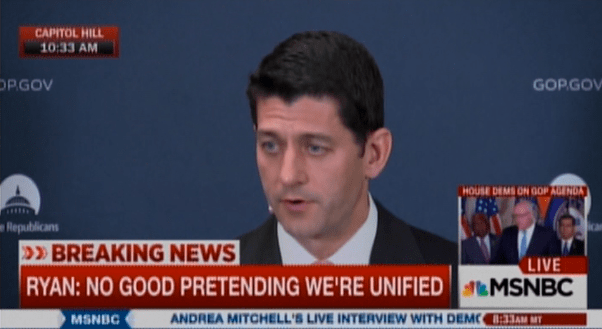House Speaker Paul Ryan just took a small number of questions about Donald Trump and his efforts to genuinely unify the GOP for the November election. It was notable what he did and did not say.
The gist of Ryan’s remarks is that there are different wings in the GOP, as there is in any national political coalition, and they need to unify around a common message while accepting existence of different wings, different policy positions, etc. Secondly, it’s been a deeply bruising primary. Simply on an interpersonal level, it takes a while to absorb and get past that.
This is all true and is the case after any strongly contested primary process in either party.
But Ryan did not address what appears to be the real crux of the situation.
Trump has embraced various positions that many Republicans and much of the population sees as simply beyond the pale of mainstream political discourse.
Some examples.
Banning Muslims from visiting or immigrating to the United States.
Rapidly expelling roughly 3% of the current US population, i.e., a 12 to 18 month process of deportation roughly 11 million undocumented or “illegal” immigrants in the US.
Coercing one of the two states bordering the United States to pay to build a wall along our mutual border, something that could credibly be viewed as a casus belli.
A more or less open invitation for white nationalists and open racists to join his political coalition.
Using as yet unspecified powers to prevent US companies from building or opening factories outside the US or seizing currency transfers to build his border wall.
There are various other policies Trump has embraced. There are many more which have simply gained less notice. But let’s focus on these for now.
Then there’s the more diffuse but equally significant issue of tone and role in the public square. Trump has tolerated and encouraged public violence, often against various political enemies he’s identified. He’s demonized whole groups of people and generally pressed a public posture of gratuitous insult and bullying. The frequent claims that Trump is a ‘fascist’ are overblown. But Trump has clearly embraced a program of white racial backlash and authoritarian political action. And in case you’re keeping score at home, that’s not good.
Among Republicans there’s some demand for a more litmus test approach to opposing all tax increases and other core GOP issues or abortion policy. That’s fine and they’re real concerns for Republican ideologues. But again, they’re not the real issue at stake here.
Stated in these terms (and I don’t think these terms are terribly controversial), the question facing Ryan and the GOP seems less coalitional than existential. Can Republicans embrace that political agenda and approach to governance? This isn’t Tea Party versus business Republicans or libertarians vs traditionalist evangelicals. It’s an agenda that has so far been outside the realm of at least national GOP candidates and puts a lot of the constitutional framework of government under pretty clear strain. It also puts the GOP in a pretty much open embrace of white racial backlash.
Is there really a way to unify on those terms?
I’m not naive. I think there are plenty of Republicans who are ready to get on board – especially if Trump’s polls start to show he might have some solid chance of winning. But let’s not pretend this is a matter of uniting a bruised party’s various factions. Trump’s politics takes the GOP on to fundamentally new ground – authoritarian, open in its embrace of racial backlash and revanchism, aggressive and destabilizing abroad.
That’s a choice. No papering that over.






